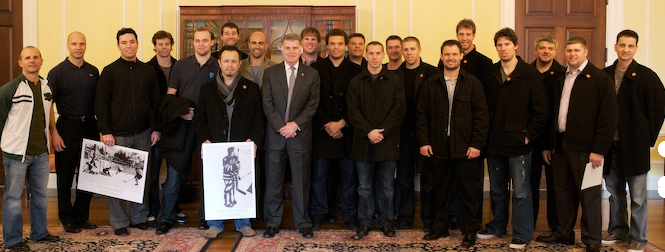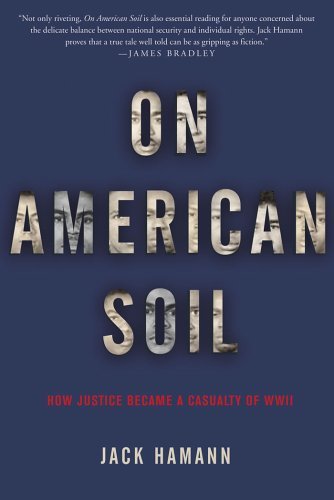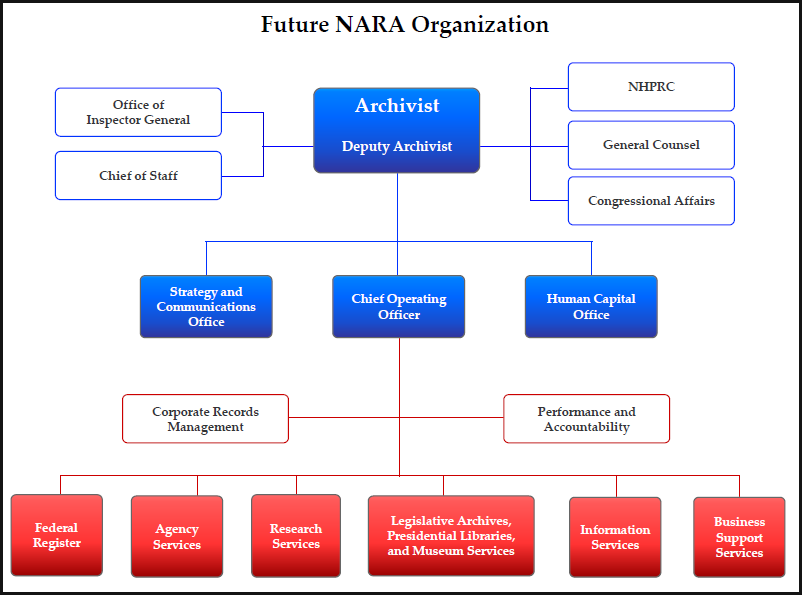Archive for February, 2011
Written on: February 25, 2011 | 1 Comment
Two weeks ago, the San Jose Sharks came to visit the National Archives for a behind-the-scenes tour on their day off in Washington before playing the Capitals. As professional athletes go, they had plenty of interest in our records — especially the declassified 1930′s contingency plan to invade Canada!

As you may know from a previous blog post of mine, one of my favorite quotes is from Wayne Gretzky:
“I skate to where the puck is going to be,
not where it has been.”
Now, more than ever, adapting this mindset will help us transform the National Archives. This approach will help us innovate in order to address the changing needs of our customers — the Federal agencies, White House, and Congress we serve as well as the American public.
The way we do our work today was envisioned in the earlier part of the 20th century when the format of choice was paper. In order for us to fulfill our mission in the 21st century, we need to reexamine our theories and practices to take advantage of the tools enabled by this technological age. We need to develop the skill sets that will move us beyond our current capabilities, as we continue our basic job of collecting, protecting, and providing access to the records of… [ Read all ]
Written on: February 17, 2011 | 8 Comments
On Monday, President Barack Obama requested $422,501,000 for the National Archives and Records Administration for Fiscal Year 2012. This is an 8.2 percent decrease from the President’s budget request of $460,287,000 for Fiscal Year 2011.
The reality is we’ve got to do more with less.
This fiscal situation is not likely an aberration, but a challenge we will face as an agency for the next five years. We are, however, well positioned to meet this challenge.
The greatest budget savings will come from the earlier decision to move the Electronic Records Archives directly into an operations and maintenance mode. We will also leverage our transformation efforts to make the most of a difficult situation.
Our transformation plan — Charting the Course – will be our roadmap. The planned reorganization will create a new structure that will enable us to find more efficient ways of doing our work. We will foster a new culture that innovates and thrives on change. We will find new ways of exploiting technology to drive down cost and help other federal agencies do the same.
Innovation will be central to our work. This budget climate presents us with an opportunity to find efficiencies in our work that we would never have thought of under different circumstances.
We will continue to rely on the experience of the National Archives… [ Read all ]
Written on: February 10, 2011 | 1 Comment
I want to thank you, Jack, for visiting the National Archives recently to discuss your book, On American Soil: How Justice Became a Casualty of WWII.
Your book is a powerful example of the importance of the records of the National Archives. You tell the story of Private Guglielmo Olivotto, an Italian POW who was murdered at Seattle’s Fort Lawton. How did you first learn of Private Olivotto’s story?

In 1986, while a young news reporter, I attended a dreadful public hearing at Seattle’s Discovery Park, the former site of a large US Army installation called Fort Lawton. The hearing–about the proposed expansion of a sewage treatment plant adjacent to the park–was dull as dishwater. Sensing my boredom, a park employee mentioned a mysterious World War II headstone in a remote Fort Lawton cemetery. As I soon discovered, it was the grave of Italian prisoner of war Guglielmo Olivotto, still interred on American soil decades after his August 14, 1944 death at age 33. I was stunned to learn that 43 US soldiers–all of them African-American–eventually stood trial charged with rioting and with Olivotto’s death by lynching. After a year of research, we aired a television documentary about that astonishing trial.
After your September 1987 documentary, “Discovery Park Graves,” what made you doubt the story and prompt you to research it further?
The documentary
… [ Read all ]
Written on: February 3, 2011 | 6 Comments
In his State of the Union address last week, President Barack Obama said, “We can’t win the future with a government of the past.” He called for a reorganization of government to give the people “a government that’s more competent and more efficient.”
At the National Archives, we are meeting the President’s call to action. Charting the Course is our plan for reinventing the National Archives to meet the demands we face in the digital age.
Our plan was developed with the help of over 40 staff members working on the Transformation Launch Team and in consultation with hundreds of National Archives’ staff. It represents the changes we must make to better serve the American people.
How are we going to become more competent and more efficient?
We’re creating a new culture based on common values at the National Archives. We’re restructuring the agency to better serve the American people and the government. And we are living the principles of Open Government — transparency, participation, and collaboration.
The chart below represents the future structure of the National Archives. This is not a “rearrangement of the deck chairs,” but a bold new way of positioning ourselves to face the future.

While the full story is told in… [ Read all ]



